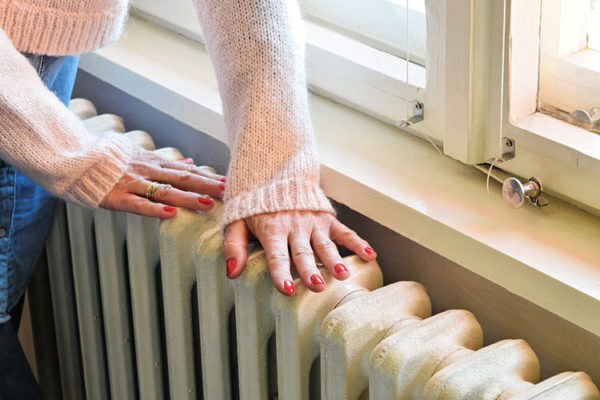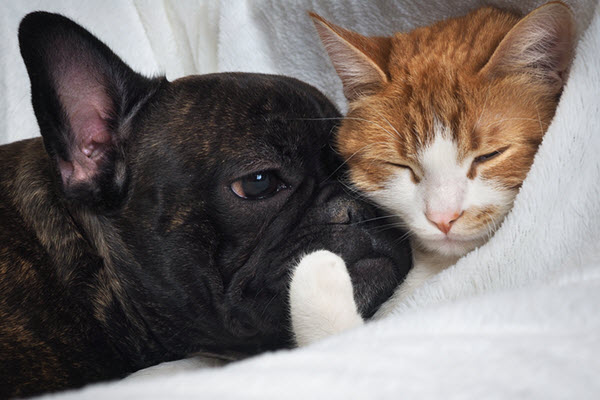This is a tale of nippy nights, resistant radiators, and talking to inanimate objects. Objects that I implored to do my bidding. Switches and circuits and tubes of old iron. Was this a matter of anthropomorphism — attributing human characteristics to nonhuman things — run amok? Could coaxing my hapless heating system into working possibly do the trick?

All I know is this. Inside my apartment bedroom, it was chilly. Not so frosty that I could see my breath, mind you, but b-r-r-r-r-risk. And with temperatures plummeting outside, sleeping under five blankets (and in my clothes) was getting old. Very old. After a week, I’d had enough.
Now, this little challenge occurred back in November. The landlord responded to my message of concern, stopped by, and patiently explained how the heating system in one half of the flat differed from the other. He showed me. He got the heat to turn on. I was relieved.
But a few days later?
I had been tweaking the thermostat as instructed. I did so in the early evening. I did so in the middle of the night. But all I got was… nothing. No reassuring click “on” from deep in the bowels of the building. No gentle humming of mysterious machinery. No rushing or whirring. And definitely no heat.
If at First You Don’t Succeed… Do It Differently!
As I persisted — fussing and fiddling with the thermostat off and on over the course of days (and nights) — occasionally the radiator would warm to a half-hearted degree. This was progress; I could peel off the sweaters and sleep under a “mere” four blankets. But by morning, the old iron radiators were as cold as ice.
In the past month, as unseasonably warm weeks yielded to more wintry weather — temperatures in the twenties for days — once again, the heat has been doing a daily dance of “now I work and now I don’t.”
I was back to being bundled up and blanket bound, fighting with the thermostat at 3 a.m., and pouting over the petulant radiators’ refusal to properly perform.
Too embarrassed to call the landlord, I tried a different tactic. I spoke to the thermostat, sweetly, saying, “Come on, you can do it.” And I spoke to the radiators, too — tenderly — whispering, “Come on, baby, I know you can do it.”
Weirdly, one morning about a week ago, at an 85-degree setting and with continued cooing from me, the radiators grew hot, stayed hot, and the room has remained (happily) heated ever since.
Care to guess what else? Each time I warm my hands on the toasty top of the closest radiator I say aloud, “thank you.”
Do You Talk to Your Cat? Do You Coo at Your Car?
Now, when it comes to talking to objects, and more specifically seeing humanity in inanimate objects — anthropomorphism — we know that children speak to their teddies and toys as a matter of imagination, and also to keep themselves company. They make friends with “things” in part because they project life onto objects. And, well, why not — particularly before we are taught otherwise? Doesn’t doing so engage the adult imagination as well as the child’s? Doesn’t it feel good to anthropomorphize, even a little? And can’t this behavior also be the result of — and an antidote to — loneliness?

Certainly, the loneliness-antidote rationale holds true for adults, and it makes sense. People need social interaction. We need to give love as well as to receive it. Why wouldn’t we develop a fondness for nonhuman objects that we admire, that give us pleasure, that serve as good-memory talismans, or that exhibit human-like qualities?
And isn’t the need to connect to the caring part of ourselves a key element in adoring our pooches, pussycats, and parakeets?
Okay, fine. It’s one thing to be talking to our pets — and even to our plants — but what if we find ourselves talking to the art on the walls, to the jeans we’re squeezing into, to the groaning innards of our flooded Fords, or… to the radiators beneath the bedroom windows?
This Daily Mail article assures us that talking to our pets and our cars is a sign of intelligence. (Phew!!!) Moreover, unpredictability is a factor in this habit, as the writer notes one study showing:
…unpredictability is why we’re more likely to speak to our car if it malfunctions or functions unexpectedly.
Hello? Heating gremlins?
Situations of unpredictability aside, I confess: I have spoken to art I love (“you’re so beautiful”); I have chided jeans I’m squeezing into (“don’t do this to me!”); I praise my aging vehicle after a long road trip (“good girl”); I continue to converse appreciatively with my fickle and fluky radiators (“thank you”); and yes, those who know me can well imagine that I have also gushed glowingly in the direction of my shoes.
However, I submit: These are very human responses to scenarios that don’t involve loneliness.
Expressions of Emotion, and More
Here’s my theory on the subject. We speak to objects as a way of speaking to ourselves – and possibly to our gods — to offer encouragement, to articulate wishful thinking, to nudge our way along a better path, to allay fears, and to express (or perhaps project?) a range of emotions including gratitude.
A hint of superstition when something seems to work? Yup. That, too.
I am not suggesting these are the only reasons that we address or otherwise anthropomorphize our objects; people are not so simple as that. However, these are the reasons for most of my conversations with things rather than people, and they seem to have assisted with my dramas over the heat.
Now, many people assume that if you speak aloud when no one else is present, you’re in trouble. Not so! Most of us talk to ourselves at times. And some measure of that may indeed be tied to loneliness. But as the Daily Mail article points out (intelligence, remember?):
While studies haven’t proven a clear link between anthropomorphizing and social intelligence … the association is likely strong because the more often humans engage with other minds, the more successfully we interpret their intentions, which makes us more socially intelligent.
Sounds good to me!
Lonely Talk?
Still, let’s not discount the impacts of social isolation and loneliness. This article on Social Psych Online addresses anthropomorphism and loneliness, but this observation in particular caught my eye:
People feel “lonely” when their actual social relations fall short of how much social connection they want. This means that people can still feel lonely even when they do have social bonds and appear to everyone else as though nothing’s wrong. It can also mean that people who have very few relationships do not necessarily feel lonely.
 I found enormous wisdom in those remarks — and at least a partial explanation for why some of us who live/work alone are far less “lonely” than others with much more human interaction.
I found enormous wisdom in those remarks — and at least a partial explanation for why some of us who live/work alone are far less “lonely” than others with much more human interaction.
Speaking for myself — forgive the pun — even during all the years that I was living with two children, as well as the period of time when I was living with a significant other, I had moments of loneliness despite too little time to myself. And, I have never denied that I talk to myself. I also admit that I occasionally spoke aloud to objects in those years of my very populated household. So what explains it?
While I don’t dismiss notions of loneliness that can impact us all, my imbuing the “resistant” radiators and their “petulant refusal to properly perform” with human characteristics has zero to do with my living alone. Unpredictability and malfunctioning mechanisms, as I have now learned, are determining factors. And, the resulting act of corralling emotions through speech is a useful outlet. Cooing at the heating system is about keeping calm enough to persist, connecting to a “can do” attitude in myself, and using my own words and soothing tone to facilitate both.
Besides, a little appreciation is always a good thing to send out into our wondrous, wild yet ofttimes “wily” universe…
Ah. There. Did you catch that? I did it again!
Do you talk to inanimate objects? If so, which ones? And with what emotional tone — and response? Do you talk to yourself as well? Does your living arrangement alter any of this?
You May Also Enjoy
Iron radiators, when they get some hot water in them, are wonderful. I hope yours keep delivering.
You said you moved–to a new city? If so, are you finding it easy or hard to make new friends? I am very curious about that process. It’s one thing when you’re young, but I imagine it’s different later in life.
Yes, I moved two years ago — hundreds of miles. Everything — absolutely everything — requiring starting over. And I did so again, a few months ago. Another restart from zero.
It is indeed much much harder when you are older.
I know your pain. I’m in the anxiety and depression of it too!
The layers of blankets sound like you might get too smushed with how tiny petite you are.
I wanted to talk more about the loneliness, but I’m in no shape to get my mind in order for it right now.
Hi D.A., I’m hoping by now that your heating systems are caring for you! I agree with you as you muse earlier in the week on this subject and on your theory, “We speak to objects as a way of speaking to ourselves.”
“Do you talk to inanimate objects?” You asked. At first, I thought, “No?!?”
I definitely talk out loud constantly with my dogs as we connect through our routines of the day. And they both do speak back to me and each other out loud. However their (dogs) language is unique to each of them and living with them I have learned their language as well as they have learned mine.
I also speak out loud (in the private area of my patio) to the tiny frogs, walking sticks, ladybugs, dragonfly, butterflies and birds. However, I think none of them speak back specifically to me, although they do speak out loud.
Back to inanimate objects question. I must correct myself that I do talk out loud to my cell phone or TVs. But I think that is about having my voice in whatever I am listening, reading or watching from that inanimate object. Those objects do not speak back. And I’m allowed my negative thoughts and feelings (cursing out loud) at those inanimate objects ONLY in the privacy of my home alone.
Now, to the question of loneliness. I think speaking out loud is not a matter of loneliness or alone which are two very different emotions. It’s is for me an expressing of myself. When I feel loneliness or utterly alone in this world, I get very quiet and listen to my thoughts, just to myself, a quiet awareness of how I’m feeling in that moment. Those feelings do pass, eventually.
I also talk out loud in my sleep, dreaming, and sometimes wake up still talking out loud.
Okay. There you have it! Am I officially nuts? ???
Ha! If you’re officially nuts, I am, too! 🙂
Maybe we are delicious Cracker Jacks! ? “Cracker Jack is an American brand of snack consisting of molasses-flavored, caramel-coated popcorn and peanuts, well known for being packaged with a prize of trivial value inside.“
🙂